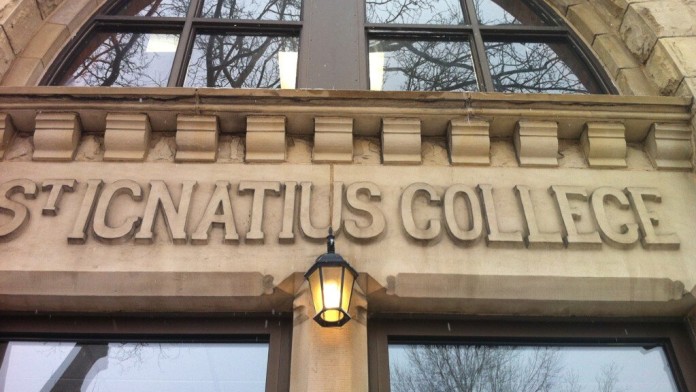by John Selby ‘15
The implementation of random drug-testing as a key component of the Student Wellness Initiative announced on April 29 has been a source of significant controversy inside and outside of the Saint Ignatius community.
The discussion has evolved both inside the school community through debates in Morality class, and through explicit and sometimes negative student reactions expressed in written form such as Ben Seeley’s ’14 recent opinion article published online in Scene Magazine. At the heart of the debate has been the definition of privacy and the degree to which the drug testing program is sanctioned by law.
The 4th Amendment to the Constitution in the Bill of Rights guarantees “the right of the people to be secure in their persons, houses, papers, and effects,” against unreasonablesearches and seizures. While this Amendment protects citizens against unjustified, warrantless incursions by the police, the Court has also extended the 4th Amendment to protect the rights of students from unreasonable searches by public school officials. But the Court has also upheld the right of public schools to combat drug abuse through random drug testing of students.
In 2002 the Supreme Court ruled in Pottawatomie County v. Earls that all students involved in extracurricular activities could be randomly drug tested.
But what of Saint Ignatius’ plan to test all students?
“There are no legal ramifications [with random drug testing] as we are a private institution,” said Principal Bradesca.
As a private school, Saint Ignatius is not bound by the same constitutional restrictions that public schools are.
That’s an opinion that finds support among some of the student body.
“Since we are private institution, I do not feel that my right to privacy as an American citizen is being violated,” said AP Government student Harrison Klee ’15. “The administration is trying to better our community as a whole, and the compassion they are showing for students is reason on its own to not feel like some ‘right’ is being violated.”
But even if their legal rights are not being violated, some students argue that a higher ethical question is raised by the Wellness Initiative.
“As much as I agree with the safety precaution reasoning for the testing, I would argue that they may cross the line of our right to privacy,” said an anonymous student. “The testing is another restrictive, organizational structure in our lives. The greatest teacher is failure and experience. Instead of making their own moral decision on whether or not they choose to use such substances, now the school may force students into that decision out of fear of ‘getting caught’.”
Students in the mandatory government classes are instructed in the values that the American republic was built on, including the right to privacy. The possibility exists that a “disconnect” may become apparent for students in government class or other history classes that discuss the legacy of the United States Constitution.
A stranger is using scissors to take a solid chunk of hair from every student’s scalp to determine the results for something that the student may never have been involved in to begin with. Private institution or not, students may grow to feel that their privacy has been lost.
“I understand why some may feel a ‘disconnect’ on some level,” said an anonymous AP Government student. “In class, we have learned about the core constitutional values the Founding Fathers used to build this nation, including the right to privacy, so I think [drug testing] is complete hypocrisy on the school’s part because it entails the complete opposite of what we learn in class.”
According to Mr. Bradesca, however, the response from the community outside of actual enrolled students has been positive.
On the day the program was announced, Mr. Bradesca received over 75 emails, “thanking the school for being bold enough to take this next step.”






